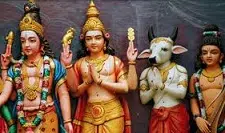 Hinduism is a religion that arose from elements of Brahmanism and Vedism of antiquity. It is the most professed faith in Indian territory.
Hinduism is a religion that arose from elements of Brahmanism and Vedism of antiquity. It is the most professed faith in Indian territory.
Hindus believe in reincarnation and a multiplicity of gods (they are polytheists). Societies organized according to the precepts of Hinduism, on the other hand, are ordered according to a caste system .
In addition to having a widespread presence in India , Hinduism is the majority religion in Nepal , Bali and Mauritius . There are also a significant number of Hindus in countries such as Pakistan , Bangladesh , Cambodia , Thailand , Malaysia , Great Britain , Panama and the United States .
Not having a single sacred book, prophets or ecclesiastical authorities, Hinduism is sometimes defined as a set of religious and philosophical beliefs linked to certain rituals and customs , and not as a structured religion.
Beyond the differences between each current, it can be said that Hinduism is based on the belief that there is an impersonal and absolute divinity (the Brahman ) that sustains the visible universe. Each human being is part of a cycle of reincarnations that only reaches the end when it is possible to return to the divine principle.
This cycle of reincarnations is determined by dharma (correct actions) and karma (the consequences of what has been done), which mark evolution or involution. The succession of birth-life-death-incarnation ends when the soul is freed from the body and unites with the absolute god.
These two concepts are part of the group of beliefs most relevant to Hinduism. Dharma is one of the Purushartha , the four goals of a man's life, which are mentioned in the sacred scriptures known as the Dharma Shastras . To complete the list of objectives of Hinduism we must indicate artha , kama and moksha . Let's see below a brief definition of each one:
 * dharma : its etymology leads us to meanings such as "religious law", "correct pious conduct" or "religion", which is not difficult to understand that it refers to those actions that we should carry out to follow the path of justice . Many religions and doctrines use this concept, such as Jainism, Sikhism and Buddhism, although there may be slight differences between them. It is worth mentioning that dharma cannot be translated using a single word in our language;
* dharma : its etymology leads us to meanings such as "religious law", "correct pious conduct" or "religion", which is not difficult to understand that it refers to those actions that we should carry out to follow the path of justice . Many religions and doctrines use this concept, such as Jainism, Sikhism and Buddhism, although there may be slight differences between them. It is worth mentioning that dharma cannot be translated using a single word in our language;
* artha : this term is defined as "motive, notion, meaning, cause" and refers especially to the concept of "material prosperity." This goal of Hinduism is considered noble as it is in accordance with the morality of the oldest texts. In short, it is about achieving fame and high social status, in addition to collecting large sums of money ;
* kama : is sexual plenitude, gratification and pleasure through the senses and the enjoyment of love . It is the lowest step on the ascending path of Hindu souls, even lower than the earthly world. In this context is the Kamasutra , an ancient book in which sexual relations between human beings are discussed;
*moksha : refers to the liberation of the spirit . According to Hinduism, the soul is enclosed in a physical body and when it passes to a new one it must enjoy the results of good karma and suffer the consequences of bad karma. In other words, karma is linked to the soul and not to the material body in which it is found when it commits each action.
It should be noted that the spiritual teacher of Hinduism is known as a guru . This is a religious leader who provides advice, teaches meditation and guides ceremonies.
